Can fish drown in water?
The dictionary describes drowning as “to die or kill by immersion in liquid.” So, technically, a fish drowning in water is not possible. However, it is possible for a fish to suffocate if the water doesn’t contain sufficient dissolved oxygen.
To learn more about the typical fish’s unique breathing mechanism and find out how fish breathe in the water, read this guide!
How Do Fish Breathe in the Water?
All species of fish need oxygen to survive. The fish’s respiration process is a complicated, fascinating one, but essentially, fish breathe by passing water over their gills.
To extract dissolved oxygen from the water, the fish must force water across the gills, and they do so by using a small skin flap called the operculum.
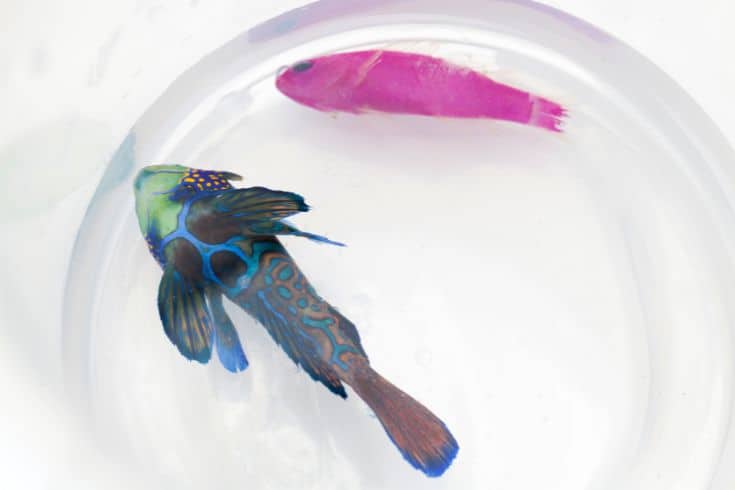
As the fish breathes, it adjusts the pressure in its mouth to move water. For example, water is pushed out through the operculum by raising the mouth’s floor, and by lowering the floor, water flows in.
Feathery filaments inside the gills extract dissolved oxygen from water as it flows past in a process called the “countercurrent exchange.” Oxygen is then absorbed into the bloodstream via the epithelium tissue.
Oxygen levels in water are much lower than they are in the air, so fish need to shift a lot of water to survive. The gills’ large surface enables the fish to gather as much dissolved oxygen as possible, and if the fish can’t do that, it could suffocate or “drown.”
The Labyrinth Organ
But that’s not the whole story! In fact, over 370 fish species can breathe atmospheric oxygen through a special breathing organ. These fish are classified as facultative or obligate fish.
- Facultative air breathers only use their ability to breathe atmospheric air when dissolved oxygen in the water is scarce.
- Obligate fish need to breathe air since dissolved oxygen alone can’t satisfy the fish’s oxygen requirements.
Obligate air breathers are called labyrinth fish or Anabantoidei and include some really cool fish species such as betta fish and gouramis. These fish extract the oxygen they need directly from the air via their labyrinth organ, rising periodically to the water’s surface to grab gulps of air. The air is forced into the fish’s labyrinth organ, where the oxygen is extracted from it.
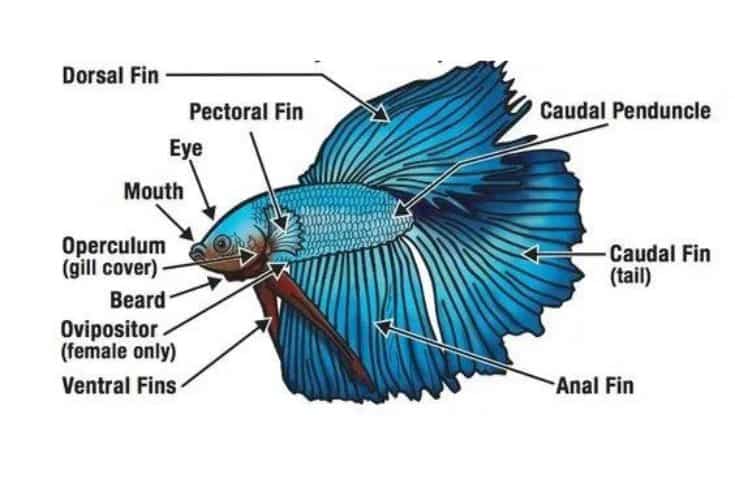
Interestingly, Anabantoidei fishes are not born will a fully-formed labyrinth organ. Instead, this special organ develops gradually as the fish matures.
How Does The Labyrinth Organ Work?
The labyrinth organ contains many small maze-like structures comprised of thin bony plates called lamellae. Oxygen passes across the lamellae and into the fish’s blood via fine membranes.
Anabantoidei fishes must breathe atmospheric air as well as dissolved oxygen to survive. If the fish cannot access the surface to breathe, some species can actually die.
So, if you have betta fish or gouramis, be careful not to cover the water’s surface with too many floating plants.
In addition, the ambient room temperature needs to be the same as the tank water to prevent damage to the labyrinth organ.
How Do Fish Gills Work?
Most fish species push water over the gills by closing and opening their mouths, which widens the gill covers.
The gill covers open as the fish’s mouth opens and the jaw drops. When the mouth closes, water is trapped inside the gills, and oxygen is extracted from it. To complete the process, water is expelled through the operculum.
How Fish Suffocate Underwater
So, as you know, most fish breathe by passing water over their gills. However, the fish can suffocate if there’s not enough dissolved oxygen in the water or the gills are damaged.
What Are The Signs Of Low Oxygen In The Water?
So, how do you know if there is a lack of oxygen in your freshwater tank?
Fish in aquariums where oxygen is short tend to show the following signs:
- Reduced activity
- Poor appetite
- Rapid gill movements or heavy breathing
- Gasping at the water’s surface
- Inflamed gills
Of course, labyrinth breathers often visit the water’s surface to grab gulps of air. However, if your fish are constantly hanging at the surface, gasping with an open mouth, that’s a clear sign of a lack of oxygen in the water.
Reasons For Low Oxygen Levels In Water
But what causes low oxygen levels in water?
Overcrowding
Overcrowding is the most common cause of oxygen depletion in your fish tank.
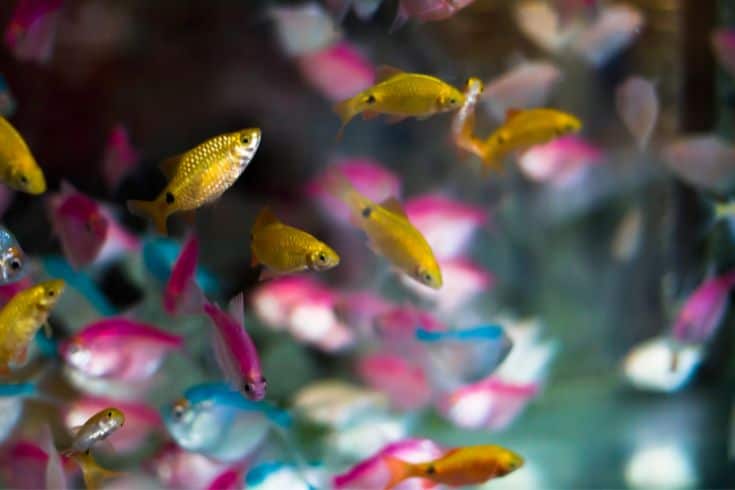
If you have a very small fish tank, there will be less dissolved oxygen in the water than there would be in a very large tank.
So, if the fish density in your tank is too high, there won’t be enough oxygen in the water to support them all.
Harmful Algae Blooms
Algae growth can be the bane of many aquarists. Flourishing algae bloom often happens without warning and can transform your pristine fish tank into a slimy green mess overnight.
Too much algae is bad for your fish’s health, too. The algae organisms gobble up all the available dissolved oxygen in the water as they die and begin decomposing, leaving your livestock deprived of oxygen.
Once the algae have all gone, it can take some time for oxygen levels to recover, and some forms of algae can even produce toxins that could kill your fish and other pets, including shrimp and aquarium snails.
One major cause of algae blooms is excess nutrients in the water and too much light.
High Water Temperatures
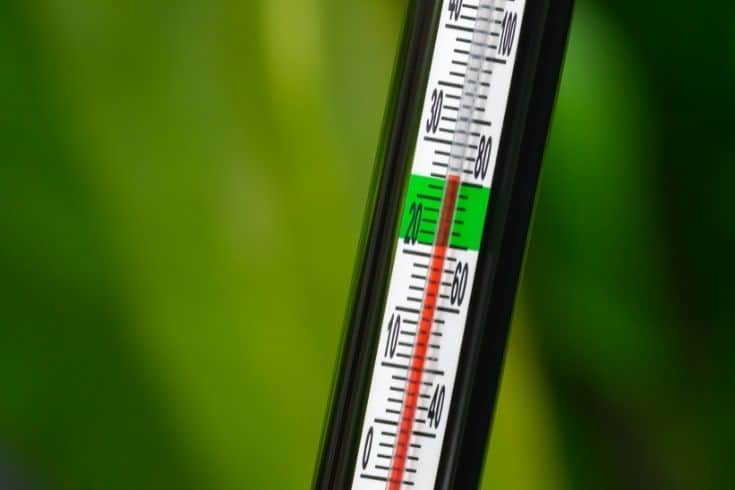
Cold water holds more oxygen than warmer water. Therefore, the warmest waters hold less oxygen than the coldest environments of the deep water of the ocean bottom.
Knowing that the water temperature affects dissolved oxygen levels is vital for your tropical fish tank management.
How so?
Well, if you’re treating your fish for Ich, you’ll need to raise the water temperature by a few degrees to disrupt the parasite’s life cycle.
Under those circumstances, I always add an air stone to my tank to increase surface agitation, drawing more oxygen into the water. That’s because warm water holds significantly less oxygen, putting even more stress on an already sick fish.
Poor Water Movement
If the filter system in your aquarium doesn’t have the correct water turnover rate for the size of the tank, that can impact the level of dissolved oxygen in the water, destabilize the water parameters, and lead to poor water quality.
Ideally, your filter pump should circulate the water throughout the aquarium and through the filter media at least four times every hour. So, when you buy a filter system, check that the GPH rate is appropriate for your tank size.
Small Water Surface Area
A large water surface area is best for efficient gas exchange. For that reason, I prefer to use a long tank than a tall one or a fishbowl, as the surface exchange of gases is more efficient.
Too Much Plant and Animal Waste
Excessive organic waste in your fish tank can have a terrible impact on the dissolved oxygen concentration in the water that’s available for your aquarium fish and lead to poor water quality.
How so?
Organic waste produces harmful chemicals, including ammonia, as it decomposes. Poor water conditions are bad news for your fish, but did you know that the decomposition process uses dissolved oxygen?
Rather like a massive algae bloom, too much waste decaying in your aquarium will reduce the concentration of oxygen in your fish tank, potentially leading to suffocation for your aquatic life.
To prevent that from happening, remember to carry out regular water changes, clean and replace your filter media, and use an aquarium gravel vacuum cleaner to remove excess fish waste, uneaten food, and organic matter from the bottom of your fish tank.
Lighting and Plant Life
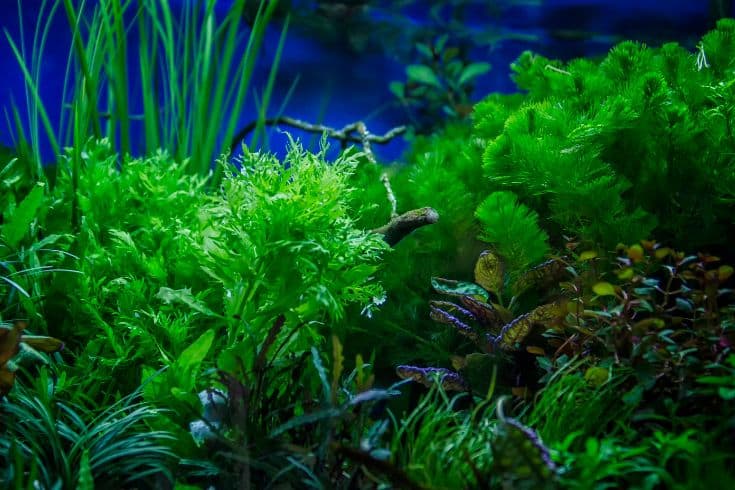
Living aquatic plants are fantastic for providing additional dissolved oxygen in your fish tank through photosynthesis. However, your plants won’t flourish if you don’t provide them with sufficient light.
If you don’t give your plants enough light, they will enter survival mode and begin consuming dissolved oxygen instead of producing it. Fortunately, that situation is easy to prevent; simply provide your plants with more light!
Chemical Treatments
Many chemical-based fish medications advise increasing the degree of aeration in your tank throughout the treatment period. That’s to compensate for how the drug interacts with the water chemistry in your tank and can be enhanced if you mix medications.
Be sure to read the instructions carefully on the medication packaging and run an air pump if the manufacturer advises.
FAQs

Here are the answers to some of your most commonly asked questions.
Q: How do you know if a fish is drowning?
A: If a fish suffocates, it usually lies on the substrate without moving, often tipping onto one side. The fish’s breathing will be labored and rapid, gradually slowing down until the fish dies.
Q: Do fish die if they stop swimming?
A: If the fish stops swimming, it can still breathe by taking oxygen from the water column. Once all that oxygen has been used, if the fish cannot swim to the water’s surface for air, it will suffocate or “drown.”
Q: Can fish breathe air?
A: Certain fish species, such as bettas and other gourami family members, can breathe atmospheric air using a structure called the labyrinth organ.
However, most fish respire dissolved oxygen through their gills.
Q: Does a fish sink or float when it dies?
A: When a fish dies, it stops ingesting dissolved oxygen, and the air in its swim bladder gradually dissipates, causing the fish to sink to the bottom of the tank. Then, after several days of decomposition, gas forms in the internal organs, causing the fish to float to the surface again.
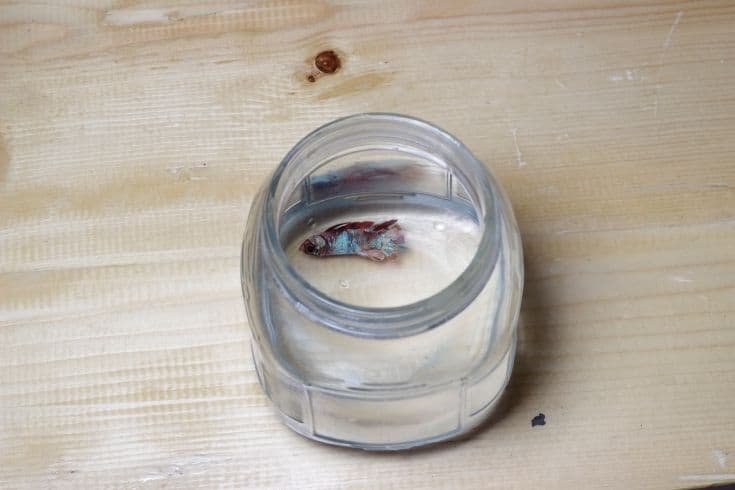
Q: How long can fish take to drown?
A: A fish can suffocate or drown alarmingly quickly, sometimes in as little as 5 minutes, depending on the amount of dissolved oxygen left in the water.
Q: Can fish drown in milk?
A: Milk contains very little dissolved oxygen, so putting your fish in a bowl of milk would see the poor creature suffocate within a few minutes.
Q: Can you drown a fish by pulling it backward?
A: Theoretically, a fish could drown if you pulled it back through the water.
Water must pass over the fish’s gills to enable the creature to absorb oxygen. If the fish were pulled back through the water, its gills couldn’t process sufficient oxygen, so it would suffocate.
Final Thoughts
I hope you enjoyed our article! Sharing is caring, so please hit the button above before you go!
Fish can’t drown in the literal sense of the word, although they can suffocate if there’s not enough dissolved oxygen in the water.
Keep your tank clean and well-maintained, provide your plants with plenty of light, protect against algae blooms, and consider providing additional aeration during treatment with medications. Finally, if you avoid overcrowding your tank, your fishy friends should breathe easy!

Thank you so much for this detailed article! fun to read too!!!